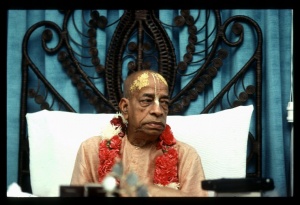CC Madhya 19.199-200: Difference between revisions
m (1 revision(s)) |
No edit summary |
||
| Line 1: | Line 1: | ||
{{ | [[Category:Sri Caitanya-caritamrta - Madhya-lila Chapter 19|C199]] | ||
<div style="float:left">'''[[Sri Caitanya-caritamrta|Śrī Caitanya-caritāmṛta]] - [[CC Madhya|Madhya-līlā]] - [[CC Madhya 19|Chapter 19: Lord Śrī Caitanya Mahāprabhu Instructs Śrīla Rūpa Gosvāmī]]'''</div> | |||
<div style="float:right">[[File:Go-previous.png|link=CC Madhya 19.198|Madhya-līlā 19.198]] '''[[CC Madhya 19.198|Madhya-līlā 19.198]] - [[CC Madhya 19.201|Madhya-līlā 19.201]]''' [[File:Go-next.png|link=CC Madhya 19.201|Madhya-līlā 19.201]]</div> | |||
{{CompareVersions|CC|Madhya 19.199-200|CC 1975|CC 1996}} | |||
{{RandomImage}} | |||
==== TEXTS 199-200 ==== | ==== TEXTS 199-200 ==== | ||
<div | <div class="verse"> | ||
sakheti matvā prasabhaṁ yad uktaṁ | :sakheti matvā prasabhaṁ yad uktaṁ | ||
he kṛṣṇa he yādava he sakheti | :he kṛṣṇa he yādava he sakheti | ||
ajānatā mahimānaṁ tavedaṁ | :ajānatā mahimānaṁ tavedaṁ | ||
mayā pramādāt praṇayena vāpi | :mayā pramādāt praṇayena vāpi | ||
yac cāvahāsārtham asat-kṛto ’si | :yac cāvahāsārtham asat-kṛto ’si | ||
vihāra-śayyāsana-bhojaneṣu | :vihāra-śayyāsana-bhojaneṣu | ||
eko ’tha vāpy acyuta tat-samakṣaṁ | :eko ’tha vāpy acyuta tat-samakṣaṁ | ||
tat kṣāmaye tvām aham aprameyam | :tat kṣāmaye tvām aham aprameyam | ||
</div> | </div> | ||
| Line 18: | Line 22: | ||
==== SYNONYMS ==== | ==== SYNONYMS ==== | ||
<div | <div class="synonyms"> | ||
''sakhā''—friend; ''iti''—thus; ''matvā''—thinking; ''prasabham''—forcibly; ''yat''—that which; ''uktam''—was said; ''he kṛṣṇa''—O Kṛṣṇa; ''he yādava''—O descendant of Yadu; ''he sakhā''—O my dear friend; ''iti''—thus; ''ajānatā''—without knowing; ''mahimānam''—greatness; ''tava''—Your; ''idam''—this; ''mayā''—by me; ''pramādāt''—out of ignorance; ''praṇayena''—out of affection; ''vā''—or; ''api''—certainly; ''yat''—whatever; ''ca''—and; ''avahāsa-artham''—for the matter of joking; ''asat-kṛtaḥ''—insulted; ''asi''—You are; ''vihāra''—while enjoying; ''śayyā-āsana''—sitting or lying on the bed; ''bhojaneṣu''—while eating together; ''ekaḥ''—alone; ''atha vā''—or; ''api''—certainly; ''acyuta''—O my dear Kṛṣṇa; ''tat-samakṣam''—in the presence of others; ''tat''—all those; ''kṣāmaye''—ask pardon; ''tvām''—unto You; ''aham''—I; ''aprameyam''—who are unlimited. | |||
</div> | </div> | ||
| Line 25: | Line 29: | ||
==== TRANSLATION ==== | ==== TRANSLATION ==== | ||
<div | <div class="translation"> | ||
“‘Thinking of You as my friend, I have rashly addressed You “O Kṛṣṇa,” “O Yādava,” “O my friend,” not knowing Your glories. Please forgive whatever I may have done in madness or in love. I have dishonored You many times, jesting as we relaxed, lay on the same bed, or sat or ate together, sometimes alone and sometimes in front of many friends. O infallible one, please excuse me for all those offenses.’ | “‘Thinking of You as my friend, I have rashly addressed You “O Kṛṣṇa,” “O Yādava,” “O my friend,” not knowing Your glories. Please forgive whatever I may have done in madness or in love. I have dishonored You many times, jesting as we relaxed, lay on the same bed, or sat or ate together, sometimes alone and sometimes in front of many friends. O infallible one, please excuse me for all those offenses.’ | ||
</div> | </div> | ||
| Line 32: | Line 36: | ||
==== PURPORT ==== | ==== PURPORT ==== | ||
<div | <div class="purport"> | ||
This is a quotation from the Bhagavad-gītā ([[BG 11.41-42]]). In this verse, Arjuna is addressing Kṛṣṇa, who was exhibiting His universal form on the Battlefield of Kurukṣetra. | This is a quotation from the [[Bhagavad-gita As It Is (1972)|''Bhagavad-gītā'']] ([[BG 11.41-42 (1972)|BG 11.41-42]]). In this verse, Arjuna is addressing Kṛṣṇa, who was exhibiting His universal form on the Battlefield of Kurukṣetra. | ||
</div> | </div> | ||
__NOTOC__ | |||
<div style="float:right; clear:both;">[[File:Go-previous.png|link=CC Madhya 19.198|Madhya-līlā 19.198]] '''[[CC Madhya 19.198|Madhya-līlā 19.198]] - [[CC Madhya 19.201|Madhya-līlā 19.201]]''' [[File:Go-next.png|link=CC Madhya 19.201|Madhya-līlā 19.201]]</div> | |||
__NOTOC__ | |||
__NOEDITSECTION__ | |||
Revision as of 03:03, 4 September 2021

A.C. Bhaktivedanta Swami Prabhupada
TEXTS 199-200
- sakheti matvā prasabhaṁ yad uktaṁ
- he kṛṣṇa he yādava he sakheti
- ajānatā mahimānaṁ tavedaṁ
- mayā pramādāt praṇayena vāpi
- yac cāvahāsārtham asat-kṛto ’si
- vihāra-śayyāsana-bhojaneṣu
- eko ’tha vāpy acyuta tat-samakṣaṁ
- tat kṣāmaye tvām aham aprameyam
SYNONYMS
sakhā—friend; iti—thus; matvā—thinking; prasabham—forcibly; yat—that which; uktam—was said; he kṛṣṇa—O Kṛṣṇa; he yādava—O descendant of Yadu; he sakhā—O my dear friend; iti—thus; ajānatā—without knowing; mahimānam—greatness; tava—Your; idam—this; mayā—by me; pramādāt—out of ignorance; praṇayena—out of affection; vā—or; api—certainly; yat—whatever; ca—and; avahāsa-artham—for the matter of joking; asat-kṛtaḥ—insulted; asi—You are; vihāra—while enjoying; śayyā-āsana—sitting or lying on the bed; bhojaneṣu—while eating together; ekaḥ—alone; atha vā—or; api—certainly; acyuta—O my dear Kṛṣṇa; tat-samakṣam—in the presence of others; tat—all those; kṣāmaye—ask pardon; tvām—unto You; aham—I; aprameyam—who are unlimited.
TRANSLATION
“‘Thinking of You as my friend, I have rashly addressed You “O Kṛṣṇa,” “O Yādava,” “O my friend,” not knowing Your glories. Please forgive whatever I may have done in madness or in love. I have dishonored You many times, jesting as we relaxed, lay on the same bed, or sat or ate together, sometimes alone and sometimes in front of many friends. O infallible one, please excuse me for all those offenses.’
PURPORT
This is a quotation from the Bhagavad-gītā (BG 11.41-42). In this verse, Arjuna is addressing Kṛṣṇa, who was exhibiting His universal form on the Battlefield of Kurukṣetra.